The topic of this article may not meet Wikipedia's general notability guideline .(October 2023) |
Infinity is a role-playing game published by The Infinity Company in 1979.
The topic of this article may not meet Wikipedia's general notability guideline .(October 2023) |
Infinity is a role-playing game published by The Infinity Company in 1979.
Infinity is a universal system, with brief rules for character attributes, skills, and magic, plus more detailed rules for all sorts of movement (including vehicles) and combat. [1] The game is designed with rules that allow consistent movement and combat in any time period.
Infinity was designed by Derrick Charbonnet and Terry Podgorski, and published by The Infinity Company in 1979 as a 36-page book. [1]
Few copies were ever distributed. It received some positive reviews for being a "universal" role playing system, but few other positive reviews. [2]
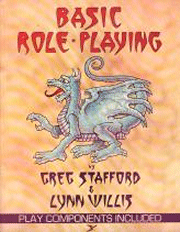
Basic Role-Playing (BRP) is a tabletop role-playing game which originated in the RuneQuest fantasy role-playing game. Chaosium released the BRP standalone booklet in 1980 in the boxed set release of the second edition of RuneQuest. Greg Stafford and Lynn Willis are credited as the authors. Chaosium used the percentile skill-based system as the basis for most of their games, including Call of Cthulhu, Stormbringer, and Elfquest.
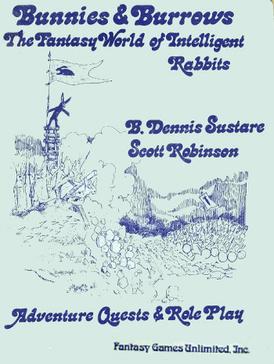
Bunnies & Burrows (B&B) is a role-playing game (RPG) inspired by the 1972 novel Watership Down. Published by Fantasy Games Unlimited in 1976, the game centered on intelligent rabbits. It introduced several innovations to role-playing game design, being the first game to encourage players to have non-humanoid roles, and the first to have detailed martial arts and skill systems. Fantasy Games Unlimited published a similar second edition in 1982. Frog God Games published a revised third edition in 2019 from the original authors. The game was also modified and published by Steve Jackson Games as an official GURPS supplement in 1992.

Fudge is a generic role-playing game system for use in freeform role-playing games. The name "FUDGE" was once an acronym for Freeform Universal DonatedGaming Engine and, though the acronym has since been dropped, that phrase remains a good summation of the game's design goals. Fudge has been nominated for an Origins Award for Best Role-Playing Game System for the Deryni Adventure Game.

The Generic Universal RolePlaying System, or GURPS, is a tabletop role-playing game system designed to allow for play in any game setting. It was created by Steve Jackson Games and first published in 1986 at a time when most such systems were story- or genre-specific.

RuneQuest is a fantasy tabletop role-playing game originally designed by Steve Perrin, Ray Turney, Steve Henderson, and Warren James, and set in Greg Stafford's mythical world of Glorantha. It was first published in 1978 by The Chaosium. Beginning in 1984, publication passed between a number of companies, including Avalon Hill, Mongoose Publishing, and The Design Mechanism, before finally returning to Chaosium in 2016. RuneQuest is notable for its system, designed around percentile dice and an early implementation of skill rules, which became the basis for numerous other games. There have been several editions of the game.

RPGnet is a role-playing game website. It includes sections on wargames, tabletop games and video games, as well as columns on gaming topics.

Traveller is a science fiction role-playing game first published in 1977 by Game Designers' Workshop. Marc Miller designed Traveller with help from Frank Chadwick, John Harshman, and Loren Wiseman. Editions were published for GURPS, d20, and other role-playing game systems. From its origin and in the currently published systems, the game relied upon six-sided dice for random elements. Traveller has been featured in a few novels and at least two video games.
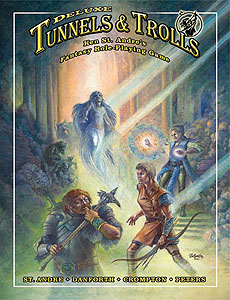
Tunnels & Trolls is a fantasy role-playing game designed by Ken St. Andre and first published in 1975 by Flying Buffalo. The second modern role-playing game published, it was written by Ken St. Andre to be a more accessible alternative to Dungeons & Dragons and is suitable for solitaire, group, and play-by-mail gameplay.
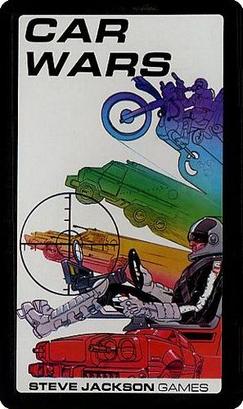
Car Wars is a vehicle combat simulation game developed by Steve Jackson Games. It was first published in 1980. Players control armed vehicles in a post-apocalyptic future.
A generic or universalrole-playing game system is a role-playing game system designed to be independent of setting and genre. Its rules should, in theory, work the same way for any setting, world, environment or genre in which one would want to play.
Dream Pod 9 (DP9), formerly Ianus Games, is a Montreal-based Canadian game publisher. Its most notable products are Heavy Gear, Jovian Chronicles, Tribe 8, and Gear Krieg, as well as the Silhouette role-playing game system.

Game Designers' Workshop (GDW) was a wargame and role-playing game publisher from 1973 to 1996. Many of their games are now carried by other publishers.
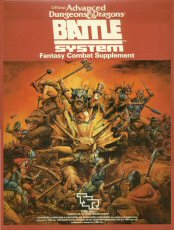
Battlesystem is a tabletop miniature wargame designed as a supplement for use with the Dungeons & Dragons role-playing game. The original Battlesystem was printed as a boxed set in 1985 for use with the first edition AD&D rules. For the second edition of AD&D, a new version of Battesystem was printed as a softcover book in 1989.

The history of role-playing games begins with an earlier tradition of role-playing, which combined with the rulesets of fantasy wargames in the 1970s to give rise to the modern role-playing game. A role-playing game (RPG) is a type of game in which the participants assume the roles of characters and collaboratively create stories. Traditionally all the participants but one take on characters and determine the actions of their characters based on their characterization and the actions succeed or fail according to a system of rules and guidelines, and one of the participants takes on the role of game master who narrates the story, plays all the non-player characters and determine the challenge rating and the outcome of various actions. Within the rules, the participants may improvise freely; their choices shape the direction and outcome of the games.
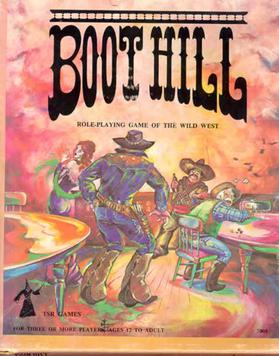
Boot Hill is a western-themed role-playing game designed by Brian Blume, Gary Gygax, and Don Kaye, and first published in 1975. Boot Hill was TSR's third role-playing game, appearing not long after Dungeons & Dragons (D&D) and Empire of the Petal Throne, and taking its name from "Boot Hill", the popular Wild West term for "cemetery". Boot Hill was marketed to take advantage of America's love of the western genre. The game did feature some new game mechanics, such as the use of percentile dice, but its focus on gunfighting rather than role-playing, as well as the lethal nature of its combat system, limited its appeal. Boot Hill was issued in three editions over 15 years, but it never reached the same level of popularity as D&D and other fantasy-themed role-playing games.
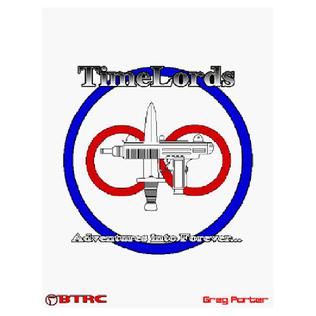
TimeLords is a set of time travel role-playing games by Greg Porter and published by Blacksburg Tactical Research Center (BTRC). The first two editions used a custom d20-based game system; the most recent edition uses the EABA system from BTRC.
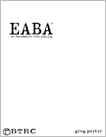
The End All Be All game system, commonly known as EABA and pronounced "ee-buh", is a role-playing game system from Blacksburg Tactical Research Center (BTRC). It is a generic gaming system designed to adapt to any imaginary gaming environment. It was created by Greg Porter in 2003. The game cites the Hero System, GURPS and Call of Cthulhu as influences in its development.

Powers & Perils (P&P) is a role-playing game written by Richard Snider and published by Avalon Hill in 1983 as a boxed set.

The Pathfinder Roleplaying Game is a fantasy role-playing game (RPG) that was published in 2009 by Paizo Publishing. The first edition extends and modifies the System Reference Document (SRD) based on the revised 3rd edition Dungeons & Dragons (D&D) published by Wizards of the Coast under the Open Game License (OGL) and is intended to be backward-compatible with that edition.

A tabletop role-playing game, also known as a pen-and-paper role-playing game, is a classification for a role-playing game (RPG) in which the participants describe their characters' actions through speech. Participants determine the actions of their characters based on their characterization, and the actions succeed or fail according to a set formal system of rules and guidelines. Within the rules, players have the freedom to improvise; their choices shape the direction and outcome of the game.